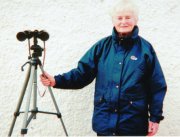Looking for AAVSO Data? Go directly to AAVSO Data Access.
The AAVSO International Database has over 54 million variable star observations going back over one hundred years. It is the largest and most comprehensive digital variable star database in the world. Over 1,000,000 new variable star brightness measurements are added to the database every year by over 700 observers from all over the world.
Quality
The AAVSO International Database is not only the largest but also the highest quality variable star database available to researchers. The AAVSO and its technical staff spend more time and resources on database maintenance and quality control than any other organization of its kind.
Quality control begins before the observation is even made. Extensive training materials are sent to new AAVSO observers and a large section of the AAVSO website is designed specifically for observing techniques. We also have a thriving group of volunteers devoted to revising and developing new sequences for variable stars. The AAVSO holds two meetings per year where members come together to discuss their observing strategies, compare results, and much more. Workshops are routinely held at these meetings, bringing the best professionals in the field in contact with the observers. Since 2000, workshops have been held on CCD imaging, Eclipsing Binary star observing, GRB afterglow hunting, data mining, and data analysis. The AAVSO also has an active mentoring program for new observers.
We have data entry error checks at every stage in the process. Our on-line data entry tool WebObs, runs error checking routines which automatically identify the most common data entry errors. In addition, every month we comb through all the observations using both human scrutiny and automated programs to look for misidentifications, typos, and any other errors. The best check, however, is the observers themselves who check their own submitted data by using the many tools the AAVSO makes available: Light Curve Generator, WebObs Search, and our VStar application which lets volunteers highlight questionable observations and bring them to the attention of AAVSO staff. All revisions to the database are themselves tracked, and no observation is ever discarded without thorough checking.
Observers
The AAVSO International Database would not exist without the dedication, tireless effort, and enthusiasm of thousands of variable star observers. Our observers come from all over the world. Over two-thirds of AAVSO observers contributing data come from outside of the United States.
Thanks to this broad network of observers we have coverage across most time zones and latitudes regardless of weather or other regional disruptions.
To make it easier for the widely-scattered AAVSO members and observers to gather together in person, AAVSO meetings are held in different locations. (They also include a remote-attendee option.) The Annual Meeting takes place each year usually in October or November, and in some years a second AAVSO meeting (the Spring Meeting) is held in April-July.
The AAVSO receives observations from members of other variable star observing associations around the world for inclusion in the AAVSO International Database and dissemination to the astronomical community worldwide. These observations are sent regularly by the group leader/representative or directly by the group members themselves. The AAVSO values these fruitful, mutually beneficial collaborations, and truly appreciates the ongoing efforts of everyone involved in working together for the benefit of the astronomical community.
Access
Observations from the database are available to anyone at anytime, a free resource for the global scientific community. For raw observations, simply fill out our online request form. For access to light curves, use our Light Curve Generator which works in all browsers (you do not need JAVA or any special plug-ins), and for really quick access to recent data, use the WebObs Search utility on our website. Our online systems are instantly updated every time data are submitted to the AAVSO.

